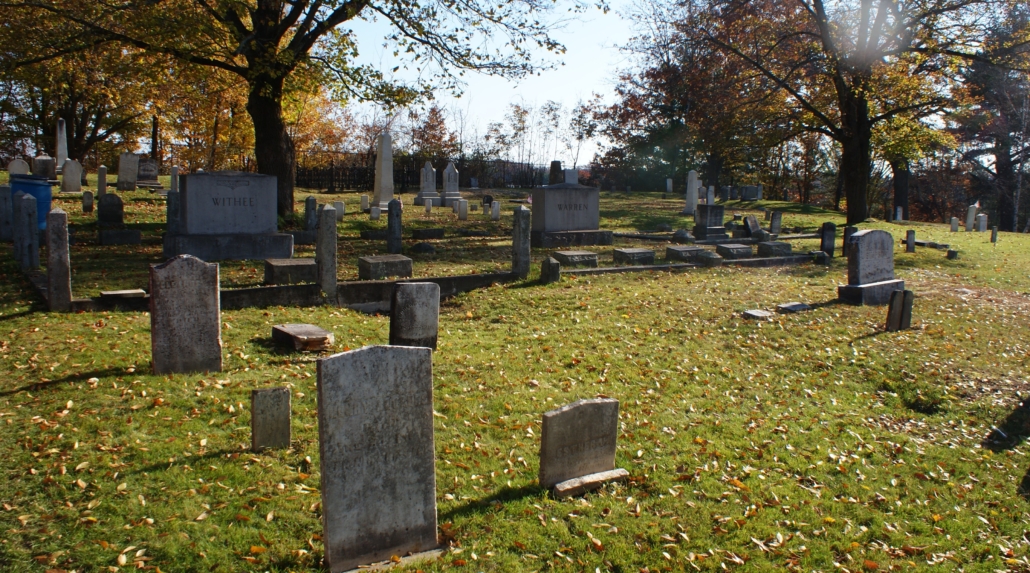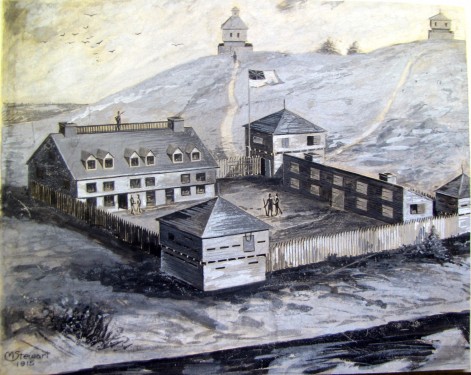Stories from Fort Hill Cemetery: Joseph Eaton (1800 – 1860)
by Kit Alexander
As you walk through the entrance of Fort Hill Cemetery and look left, you will see a tall, granite obelisk dated 1886 with the name Eaton inscribed on it. The monument looks a little out of place in this humble, Winslow cemetery, but then, Joseph Eaton died a wealthy man. The simple but dignified memorial sits on the largest lot in Fort Hill, the resting place of Joseph and 15 of his direct and extended family members.
At the age of 17, Joseph came to Winslow from Bowdoin with his father, Solomon. Solomon already owned a store and other businesses in Winslow, and Joseph and he went into business together when Joseph turned 21. They engaged in trade of all types, using the rivers as their route of transportation. Besides running the store, they bought and sold land, traded in lumber, and owned several saw mills in the area.
During the years 1831 and 1834, Joseph was a selectman in the town. Elected to the Maine State Legislature from 1829-1832, he later served two terms in the Senate.
Joseph was one of the founders of the Kennebec & Somerset Railroad which stretched from Augusta to Waterville and then Skowhegan. It later became part of the Central Maine Railroad, and Joseph served as president for both.
As the years passed, Joseph engaged in other enterprises in the Winslow area, including the toll bridge over the Sebasticook River. He served as a trustee for the Waterville Liberal Institute and was president of the Ticonic Bank during the last ten years of his life.
So, we can see that the Honorable Joseph Eaton, as he was known, was a busy man, running lucrative businesses, standing for local and state offices, and lending his energy to the success of education and other community institutions. Joseph died in 1865 after a spell of paralysis, due, most likely, to stroke. His obituary described him as “…one of the most energetic and successful business men of Maine…”
In 1830, Joseph married Mary Ann Loring, of Norridgewock, and together they had nine children. Their first child, Abigail, born the year of their marriage, died at the age of seven, just three and a half years after the twins were born. Oddly enough, Abigail has two stones in Fort Hill, one in the family plot and another far away in the older section. Both stones are marked “Abbie Eaton” with a death date of 1837, so the grave must belong to the same person. Now why would that be?
The first twin, Charles, born in 1834, was initially a grain dealer, in Fairfield. In 1856, he married Mary Lucia Johnson, in Québec, Canada, and they later moved to Boston. He served in the Civil War, having been drafted in 1863. Charles died a single man in Plaistow, New Hampshire, of kidney disease in 1886.
Charles’ twin brother, Roland Leonard, appears to have been supported by his father throughout his life, living in hotels in Waterville over the years. Joseph left him one sixth of his estate in 1865, but appointed his wife and one of his sons as trustees. After five years, Roland could have free access to his inheritance if he had developed “…confirmed habits of sobriety and frugality…” An 1867 article in the Augusta, ME newspaper, Maine Farmer, described an accident in which Roland’s foot was crushed when he jumped onto a moving freight train. He died unmarried three years later.
Next came Joseph Jr., in 1837, who grew up to be a successful farmer in Winslow. He married Ellen Simpson in 1866, fathered two sons, and died three years later of heart disease. He was a Captain in Co. H. of the 19th Maine Infantry during the Civil War.
Mary Ann was born in 1839 and became the wife of Horace Batchelder in 1866. She spent most of her life in Boston and died there of heart disease in 1897.
Abbie Frances came along four years later. She was rewarded by way of a special gift in her father’s will, caring for him in his final days. She moved to Massachusetts to live with her sister after his death and married Lucius Allen in 1873, dying of heart disease in Boston in 1905.
Solomon, named for his grandfather, was born in 1846. He moved to Boston before 1860, lived with Abbie Frances, and worked in sales and bookkeeping. At the age of 59, he married Anna M. Bauer, 24 years his junior. They must have moved back to Winslow around 1832 when Solomon died and where Anna continued to live until her death in 1951.
Francis Loring was born in 1849, followed by Frederick three years later. “Frankie” and “Freddie” died nine days apart in 1857, most likely of infectious disease.
And so, at age 43, Mary Ann’s child bearing years were over. Six children had grown to adulthood in the Eaton household over a period 37 years, three having died in childhood. She passed away three years after Joseph, following what must have been a full life as the wife of a prominent businessman.
While four of the Eaton children moved to other states, they all came back to spend eternity with their family in Fort Hill. The only exception was Abbie Allen who was buried close by in Pine Grove Cemetery, in Waterville, along with her husband’s ancestors.
Besides Joseph’s nine children, Mary’s husband Horace, Joseph, Jr.’s wife, Ellen, their sons Walter and Joseph, and Joseph’s wife, Iva, were buried on the front of the plot. On the back was the resting place of Solomon’s wife, Anna, who lived until 1951.
One could assume that Joseph was the wealthiest man buried at Fort Hill. In 1850, the Winslow census showed him owning $50,000 worth of real estate. Five years before his death, the census recorded $60,000 in real estate and $10,000. in personal property, altogether worth well over $2 million in today’s money. His will contained 57 pages, and while his net worth was not indicated, it must have been significant.
And so, can we say Joseph and Mary Ann’s family was much like other wealthy families living in rural Maine in the middle of the 19th century? The father worked at a furious pace to enrich his town, increase his own wealth, and support his six children, while his wife, along with a few domestic helpers, managed the house and cared for their children. Death took three of their children early on, a common occurrence at the time.
But can we compare the Eaton family to one of today? One son appears to have been a “bad boy,” unable to conduct himself in an appropriate manner. Five children went on to live successful lives, four of them leaving the little town of Winslow for the big city. One son stayed behind, possibly to help his parents, working the land and dying at an early age. The youngest of them lived to be an old man, while the others, including Joseph, were prone to early death from heart disease. Both the Eaton family and the town of Winslow sent two of their sons to military service and brought them home again. Aside from its great wealth and the loss of three little ones, the family could be similar to others that live here today. Did the Eatons talk about the institution of slavery at their dinner table, much the same as equal rights for African Americans are discussed at supper tables today?
The older, southern part of Fort Hill, contains the graves of some of the men and women who were instrumental in carving Winslow out of the wilderness. When Joseph came to town many years later, his drive and determination helped it to continue to grow. He was responsible, in part or in whole, for some of the area’s institutions and businesses we may have heard of or can still see the remnants of today. The next time we drive north over the Sebasticook River bridge, we might think of this man and his family who are still memorialized not too far down the road and up the hill.
Responsible journalism is hard work!
It is also expensive!
If you enjoy reading The Town Line and the good news we bring you each week, would you consider a donation to help us continue the work we’re doing?
The Town Line is a 501(c)(3) nonprofit private foundation, and all donations are tax deductible under the Internal Revenue Service code.
To help, please visit our online donation page or mail a check payable to The Town Line, PO Box 89, South China, ME 04358. Your contribution is appreciated!




Leave a Reply
Want to join the discussion?Feel free to contribute!